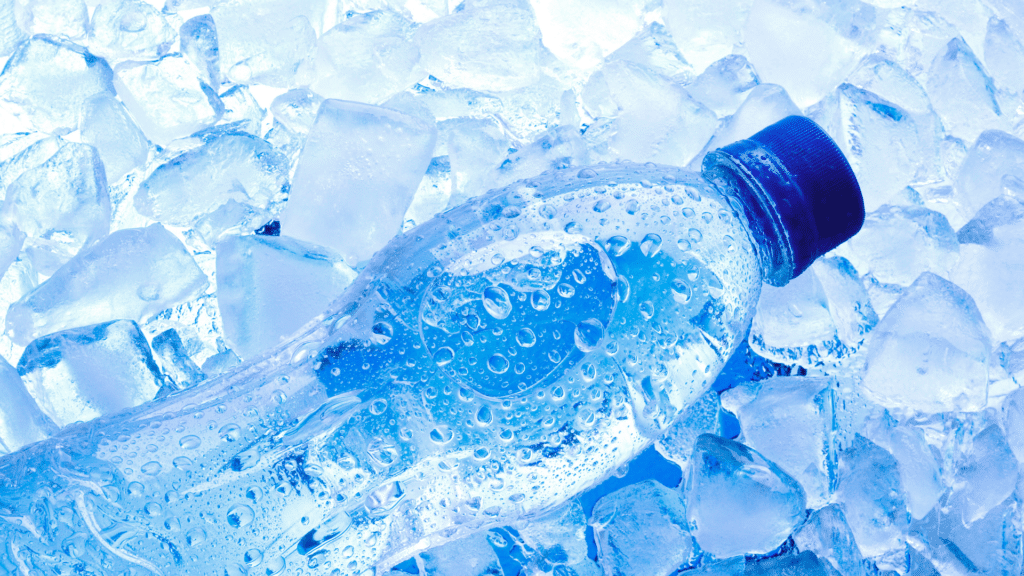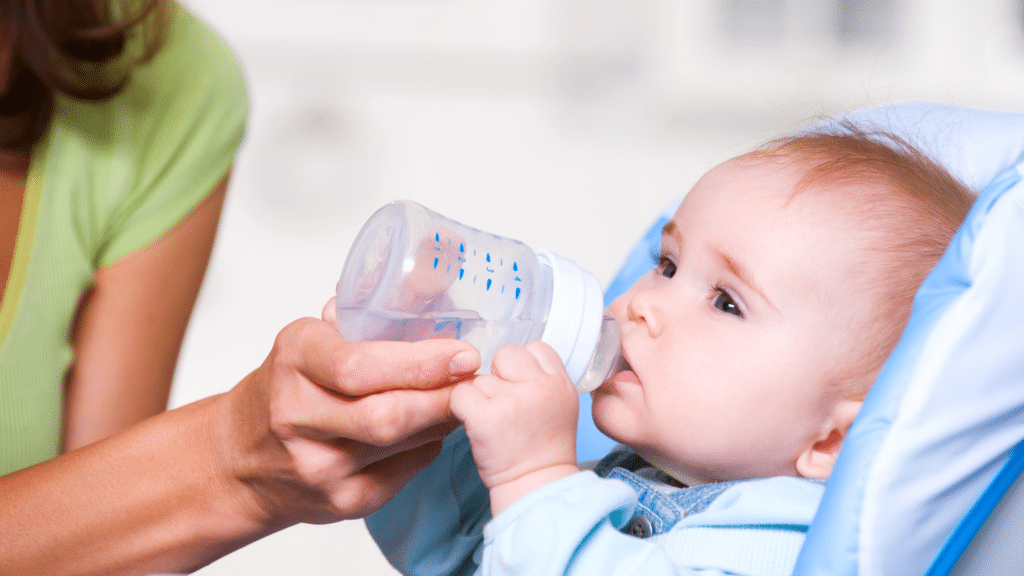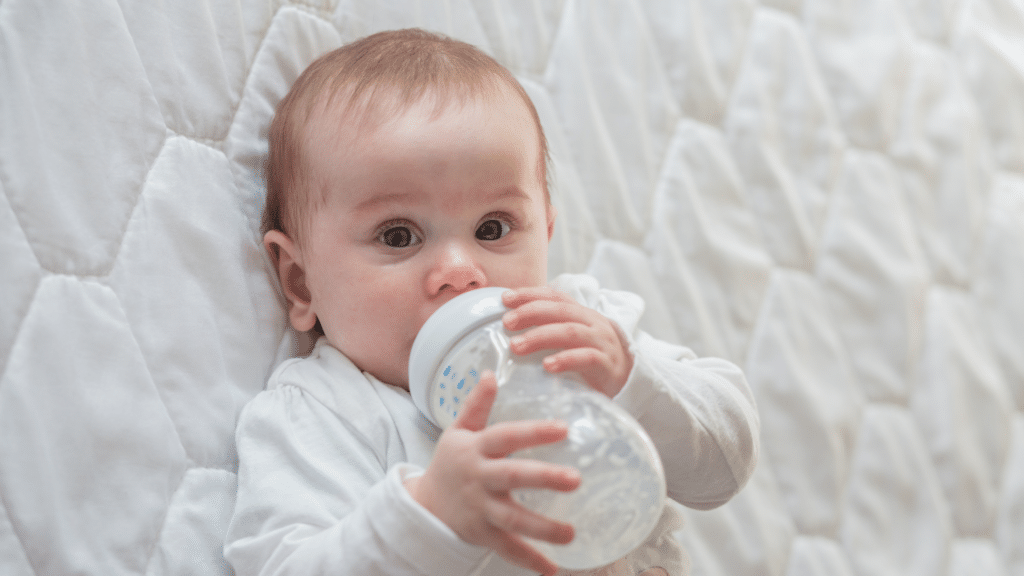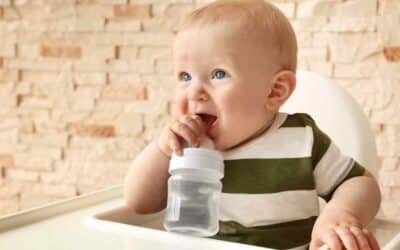As parents, we recognize the significance of offering our little one’s optimal nutrition and care. This is why grasping the role of water in baby formula preparation is essential. But when choosing between purified or distilled water, which is the better option?
Water is the primary diluent for powdered or concentrated liquid formula, making its quality critical in safeguarding our babies’ health and well-being. With their delicate immune systems, infants are more prone to infections and illnesses, highlighting the necessity for high-quality, contaminant-free water.
In this blog post, we will examine the factors to consider when choosing water for baby formula, including quality standards, purification methods, mineral content, additives, and packaging.

Understanding the Role of Water in Baby Formula
Water is vital in baby formula preparation, as it serves as the primary diluent for powdered or concentrated liquid formula. Ensuring the water is high quality and free from contaminants is essential for infants’ health and well-being, as their delicate immune systems make them more susceptible to infections and illnesses.
Here are the factors to consider when selecting water for baby formula:
- Quality standards: Choose water that meets or exceeds strict standards and certifications, such as those set by the USP, EPA, or IBWA.
- Purification method: Opt for water that has undergone rigorous purification processes, like reverse osmosis, distillation, or deionization, to remove impurities.
- Mineral content: Low-mineral water is generally recommended for baby powdered formula preparation, as high mineral content can affect the taste and may not be suitable for mixing with infant formula.
- Additives: Avoid water-containing additives, such as fluoride or chlorine, which may not be suitable for babies.
- Packaging and storage: Choose water packaged in BPA-free containers and ensure proper storage conditions to prevent contamination.
Using inappropriate water for baby formula preparation can pose several risks to infants, including:
- Contamination: Water containing harmful bacteria, viruses, or other microorganisms can cause infections or gastrointestinal illnesses in infants.
- Chemical exposure: Water with high levels of chemicals, such as lead, nitrates, or pesticides, can pose health risks to babies, affecting their growth and development.
- Mineral imbalance: Using water with high mineral content can lead to imbalances in the formula’s nutritional composition, potentially affecting an infant’s growth and health.
- Taste and acceptance issues: Water with off-tastes or strong odors may cause babies to reject the formula, leading to feeding difficulties and inadequate nutrition.
Parents can ensure that their infants receive safe and nutritionally balanced feedings by carefully considering these factors and selecting appropriate water for baby formula preparation.

Distilled Water for Baby Formula
Distillation is a purification method that involves heating water until it turns into steam and cooling it back into liquid water. Based on their boiling points, this process effectively separates water from impurities, such as minerals, bacteria, and other contaminants. Distilled water is the purified water obtained through this process, free from most impurities and contaminants.
Benefits of Using Distilled Water
Using distilled water offers several benefits in specific applications and situations. Here are some of the benefits of using distilled water:
1. Removal of Impurities and Contaminants
Using distilled water for baby formula ensures the water is free from harmful contaminants like bacteria, viruses, and heavy metals. This is particularly important for infants, as their immune systems are still developing and may be more susceptible to waterborne illnesses.
2. Consistent Water Quality Assurance
Distilled water provides consistent water quality, regardless of the source. This can be beneficial for parents concerned about tap water quality or who frequently travel and need to prepare formulas with varying water sources.
Drawbacks of Using Distilled Water
While distilled water has its benefits, it also has some drawbacks that should be considered. Here are a few drawbacks of using distilled water:
1. Lack of Essential Minerals
Distilled water lacks essential minerals, such as calcium and magnesium, naturally present in tap water and contribute to overall health. However, these minerals are typically present in the baby formula itself, so using distilled water should not impact the nutritional content of the formula.
2. Potential Impact on Taste
Distilled water may have a flat taste due to the absence of minerals. This may affect the taste of the prepared formula, but it is generally not a significant concern, as babies are not likely to reject the formula based on taste.
Expert Opinions and Guidelines Regarding Distilled Water
The American Academy of Pediatrics (AAP) does not specifically recommend distilled water for baby formula preparation. However, they advise using water free from contaminants and with low fluoride content. If you are concerned about the quality of your tap water, distilled water can be a safe and suitable option for preparing baby formula.
It is essential to consult with your pediatrician or healthcare provider for specific recommendations and guidelines regarding using distilled water or other water sources for your baby’s formula.

Purified Water for Baby Formula
Purified water has been treated to remove impurities, contaminants, and bacteria. Various purification methods exist, including reverse osmosis, carbon filtration, and ultraviolet (UV) disinfection. The specific purification method can impact the water’s mineral content, taste, and quality.
Advantages of Using Purified Water
- Eliminating harmful substances: Purified water undergoes treatment to remove potentially harmful substances, such as lead, chlorine, and bacteria, which can be detrimental to infants with developing immune systems.
- Retention of beneficial minerals: Some purification methods, like carbon filtration, can retain beneficial minerals like calcium and magnesium, which are essential for a baby’s growth and development.
Limitations of Purified Water
- The potential presence of residual contaminants: Although purified water undergoes treatment to remove contaminants, trace amounts of residual impurities might still be present. The level of residual contaminants depends on the purification method used and the water source.
- Variations in purification processes: Different purification methods can yield varying levels of water purity and mineral content. As a result, the quality of purified water can vary depending on the specific treatment process used.
Expert Recommendations and Guidelines for Purified Water Usage
Pediatricians and healthcare professionals recommend purified water for baby formula, as it offers a cleaner and safer option than tap water. The American Academy of Pediatrics (AAP) suggests using water treated through reverse osmosis, deionization, or distillation for mixing formula.
However, it’s essential to consult with a pediatrician or healthcare professional before changing your baby’s diet or water source. They can guide you on the best type of water for your baby’s specific needs and circumstances.

Key Considerations in Choosing the Right Water
When choosing the right water for mixing baby formula, several key considerations should be considered. Here are some important factors to keep in mind:
1. Quality Standards and Regulations
When selecting water for your baby, it is essential to consider the quality standards and regulations in place. Ensure that the water meets the guidelines set by your country’s health department or a reputable international organization, such as the World Health Organization (WHO). This will help guarantee that the water is safe and free from harmful contaminants.
2. Local Water Conditions and Sources
Understanding the local water conditions and sources is crucial when choosing the right water for making baby formula. If tap water is known to be high in contaminants or minerals, it may be advisable to use distilled or purified water. On the other hand, if your local tap water is considered safe and of high quality, boiling water and letting it cool to room temperature may be suitable for your baby’s needs.
3. Individual Baby’s Health Considerations
Each baby is unique, and their health needs may vary. If your baby has specific health concerns or dietary requirements, choosing water that meets their needs is essential. For instance, if your baby is at risk of consuming too much fluoride, using non-fluoridated water for mixing formula is crucial. Consult a healthcare professional for guidance on selecting the best water option for your baby.
4.Water Intoxication and Proper Formula Preparation
When making baby formula, it is important to follow the manufacturer’s instructions for mixing the formula accurately. Adding too much water or a few drops more than recommended can lead to water intoxication, a potentially dangerous condition for infants.
5. Seeking Professional Medical Advice and Consultations
Always seek professional medical advice when deciding about your baby’s health and well-being. Pediatricians and other healthcare professionals can provide valuable guidance on choosing the right water for your baby based on their needs, local water conditions, and health concerns.

Making the Crucial Decision
Making the crucial decision of choosing the right water source and purification method involves careful evaluation and consideration of various factors. Here are some steps to help you make an informed decision:
1. Weighing the Benefits and Drawbacks of Purified and Distilled Water
Distilled water effectively removes impurities, provides consistent quality, and minimizes waterborne illnesses risks, but it lacks minerals and may taste flat. It can be a safe option if tap water quality is a concern.
Purified water offers advantages such as harmful substance removal and beneficial mineral retention, but residual contaminants may remain, and quality can vary depending on the purification method.
2. Considering Individual Circumstances and Preferences
Parents should take into account factors such as:
- Local water conditions and sources: Assess the quality of tap water or available bottled water options in your area.
- Baby’s health considerations: Consider any specific health needs or sensitivities your baby may have.
- Budget and convenience: Evaluate the cost and availability of purified or distilled water options.
3. Importance of Prioritizing Baby’s Health and Safety
Parents should prioritize their baby’s health by:
- Consulting a pediatrician or healthcare professional for tailored recommendations based on your baby’s needs.
- Ensuring the water used meets strict quality standards and certifications.
- Regularly monitoring water quality and making adjustments as needed.
By carefully weighing the benefits and drawbacks of purified and distilled water, considering individual circumstances, and prioritizing their baby’s health and safety, parents can make an informed decision and provide safe, nutritionally balanced feedings for their infants.

Conclusion
In conclusion, choosing between purified and distilled water for baby formula underscores the significance of selecting safe, appropriate water for infants. Water quality is vital for babies’ health and well-being, and factors such as purification methods, mineral content, additives, packaging, and storage must be carefully considered.
Distilled water offers benefits like impurity removal and consistent quality; however, it lacks essential minerals and may affect the taste. Purified water eliminates harmful substances and may retain beneficial minerals, but residual contaminants and varying purification processes should be considered.
Making an informed decision requires evaluating individual circumstances, including local water conditions and the baby’s health needs. It is highly recommended to consult pediatricians or healthcare professionals for personalized advice.
Did this article answer your questions? Please feel free to ask any questions in the comments below.



